Business Law Assignment 2: Legal Problems and Short Answers Solution
VerifiedAdded on 2023/01/19
|9
|1933
|24
Homework Assignment
AI Summary
This document provides a comprehensive solution to a Business Law assignment, addressing legal problems and short answer questions. The assignment covers various aspects of business law, including contract law, intention to create legal relations, exclusion clauses, promissory estoppel, and consideration. The solution analyzes several cases, such as Ermogenous v Greek Orthodox Community, Foakes v Beer, and Central London Property Trust Ltd v High Trees Ltd, to support the answers. The document also examines the application of legal principles to different scenarios, such as part payment of debts, gifts, and exclusion clauses in tickets. The answers are structured to identify the issues, state the relevant rules, cite relevant cases, and provide a conclusion with reasoning. The document provides a detailed analysis of each question, offering a thorough understanding of the legal concepts involved. The assignment brief includes a breakdown of the marking criteria, emphasizing the ability to identify legal issues, apply relevant rules, and reach a reasoned conclusion.
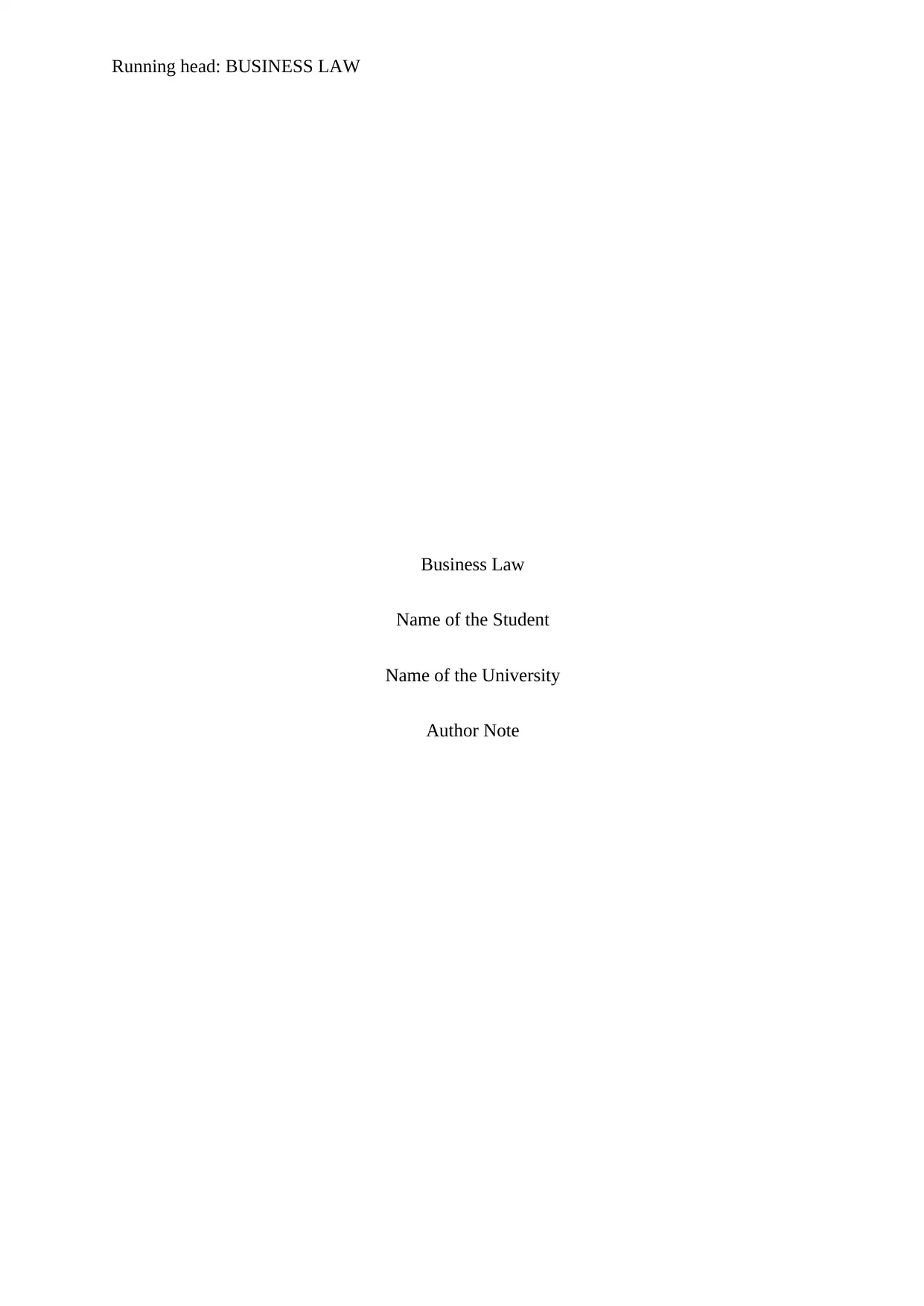
Running head: BUSINESS LAW
Business Law
Name of the Student
Name of the University
Author Note
Business Law
Name of the Student
Name of the University
Author Note
Paraphrase This Document
Need a fresh take? Get an instant paraphrase of this document with our AI Paraphraser
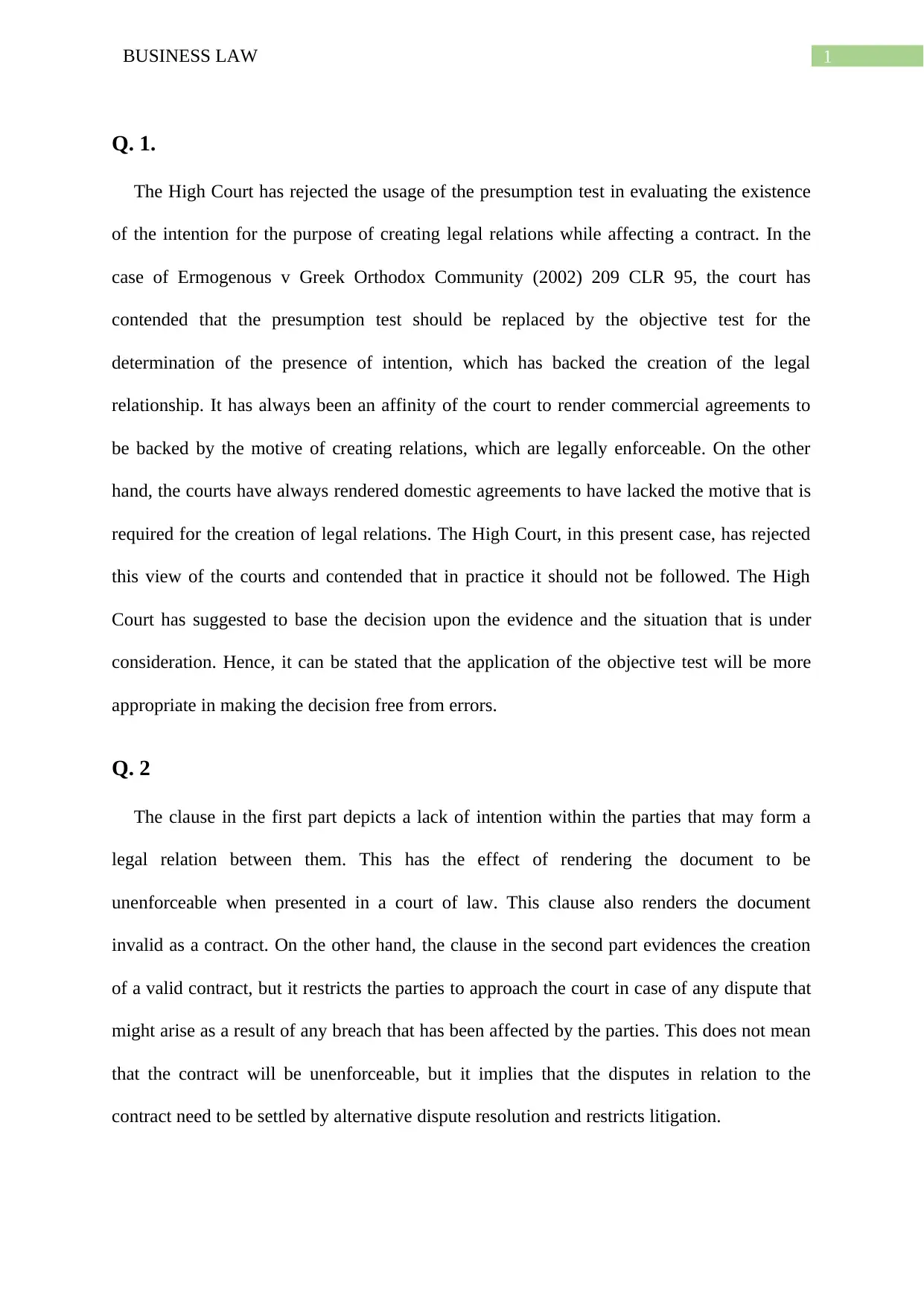
1BUSINESS LAW
Q. 1.
The High Court has rejected the usage of the presumption test in evaluating the existence
of the intention for the purpose of creating legal relations while affecting a contract. In the
case of Ermogenous v Greek Orthodox Community (2002) 209 CLR 95, the court has
contended that the presumption test should be replaced by the objective test for the
determination of the presence of intention, which has backed the creation of the legal
relationship. It has always been an affinity of the court to render commercial agreements to
be backed by the motive of creating relations, which are legally enforceable. On the other
hand, the courts have always rendered domestic agreements to have lacked the motive that is
required for the creation of legal relations. The High Court, in this present case, has rejected
this view of the courts and contended that in practice it should not be followed. The High
Court has suggested to base the decision upon the evidence and the situation that is under
consideration. Hence, it can be stated that the application of the objective test will be more
appropriate in making the decision free from errors.
Q. 2
The clause in the first part depicts a lack of intention within the parties that may form a
legal relation between them. This has the effect of rendering the document to be
unenforceable when presented in a court of law. This clause also renders the document
invalid as a contract. On the other hand, the clause in the second part evidences the creation
of a valid contract, but it restricts the parties to approach the court in case of any dispute that
might arise as a result of any breach that has been affected by the parties. This does not mean
that the contract will be unenforceable, but it implies that the disputes in relation to the
contract need to be settled by alternative dispute resolution and restricts litigation.
Q. 1.
The High Court has rejected the usage of the presumption test in evaluating the existence
of the intention for the purpose of creating legal relations while affecting a contract. In the
case of Ermogenous v Greek Orthodox Community (2002) 209 CLR 95, the court has
contended that the presumption test should be replaced by the objective test for the
determination of the presence of intention, which has backed the creation of the legal
relationship. It has always been an affinity of the court to render commercial agreements to
be backed by the motive of creating relations, which are legally enforceable. On the other
hand, the courts have always rendered domestic agreements to have lacked the motive that is
required for the creation of legal relations. The High Court, in this present case, has rejected
this view of the courts and contended that in practice it should not be followed. The High
Court has suggested to base the decision upon the evidence and the situation that is under
consideration. Hence, it can be stated that the application of the objective test will be more
appropriate in making the decision free from errors.
Q. 2
The clause in the first part depicts a lack of intention within the parties that may form a
legal relation between them. This has the effect of rendering the document to be
unenforceable when presented in a court of law. This clause also renders the document
invalid as a contract. On the other hand, the clause in the second part evidences the creation
of a valid contract, but it restricts the parties to approach the court in case of any dispute that
might arise as a result of any breach that has been affected by the parties. This does not mean
that the contract will be unenforceable, but it implies that the disputes in relation to the
contract need to be settled by alternative dispute resolution and restricts litigation.
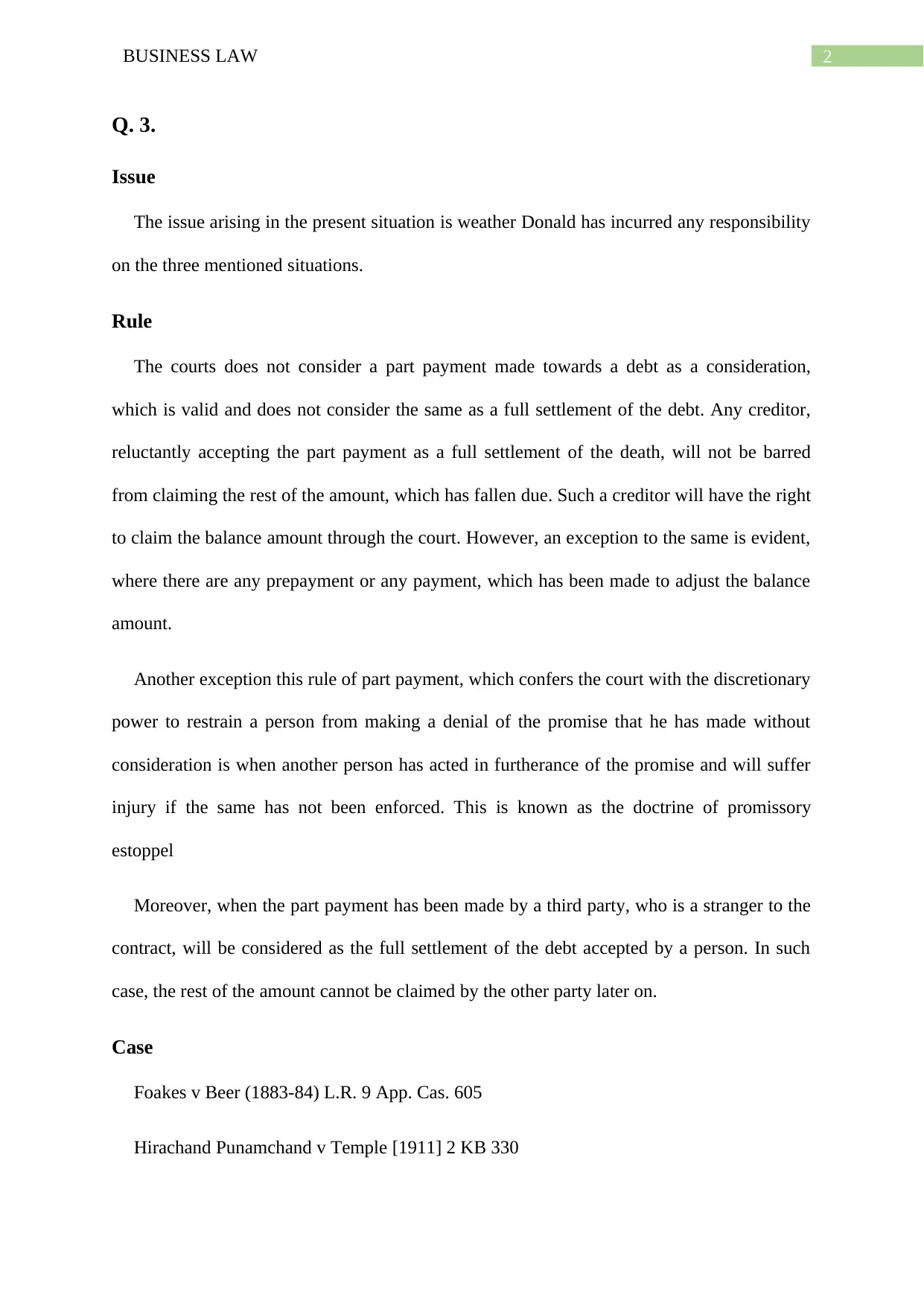
2BUSINESS LAW
Q. 3.
Issue
The issue arising in the present situation is weather Donald has incurred any responsibility
on the three mentioned situations.
Rule
The courts does not consider a part payment made towards a debt as a consideration,
which is valid and does not consider the same as a full settlement of the debt. Any creditor,
reluctantly accepting the part payment as a full settlement of the death, will not be barred
from claiming the rest of the amount, which has fallen due. Such a creditor will have the right
to claim the balance amount through the court. However, an exception to the same is evident,
where there are any prepayment or any payment, which has been made to adjust the balance
amount.
Another exception this rule of part payment, which confers the court with the discretionary
power to restrain a person from making a denial of the promise that he has made without
consideration is when another person has acted in furtherance of the promise and will suffer
injury if the same has not been enforced. This is known as the doctrine of promissory
estoppel
Moreover, when the part payment has been made by a third party, who is a stranger to the
contract, will be considered as the full settlement of the debt accepted by a person. In such
case, the rest of the amount cannot be claimed by the other party later on.
Case
Foakes v Beer (1883-84) L.R. 9 App. Cas. 605
Hirachand Punamchand v Temple [1911] 2 KB 330
Q. 3.
Issue
The issue arising in the present situation is weather Donald has incurred any responsibility
on the three mentioned situations.
Rule
The courts does not consider a part payment made towards a debt as a consideration,
which is valid and does not consider the same as a full settlement of the debt. Any creditor,
reluctantly accepting the part payment as a full settlement of the death, will not be barred
from claiming the rest of the amount, which has fallen due. Such a creditor will have the right
to claim the balance amount through the court. However, an exception to the same is evident,
where there are any prepayment or any payment, which has been made to adjust the balance
amount.
Another exception this rule of part payment, which confers the court with the discretionary
power to restrain a person from making a denial of the promise that he has made without
consideration is when another person has acted in furtherance of the promise and will suffer
injury if the same has not been enforced. This is known as the doctrine of promissory
estoppel
Moreover, when the part payment has been made by a third party, who is a stranger to the
contract, will be considered as the full settlement of the debt accepted by a person. In such
case, the rest of the amount cannot be claimed by the other party later on.
Case
Foakes v Beer (1883-84) L.R. 9 App. Cas. 605
Hirachand Punamchand v Temple [1911] 2 KB 330
⊘ This is a preview!⊘
Do you want full access?
Subscribe today to unlock all pages.

Trusted by 1+ million students worldwide
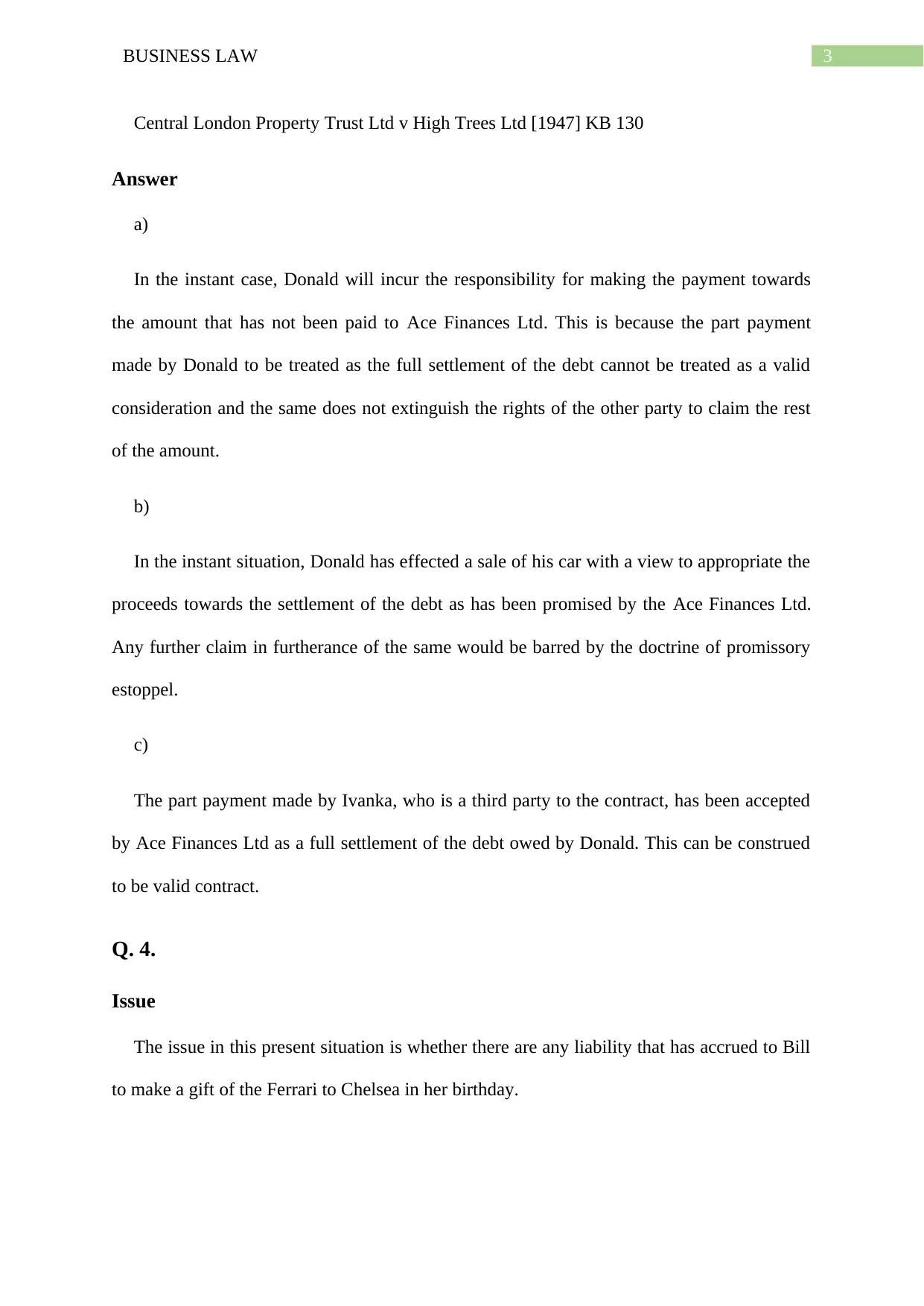
3BUSINESS LAW
Central London Property Trust Ltd v High Trees Ltd [1947] KB 130
Answer
a)
In the instant case, Donald will incur the responsibility for making the payment towards
the amount that has not been paid to Ace Finances Ltd. This is because the part payment
made by Donald to be treated as the full settlement of the debt cannot be treated as a valid
consideration and the same does not extinguish the rights of the other party to claim the rest
of the amount.
b)
In the instant situation, Donald has effected a sale of his car with a view to appropriate the
proceeds towards the settlement of the debt as has been promised by the Ace Finances Ltd.
Any further claim in furtherance of the same would be barred by the doctrine of promissory
estoppel.
c)
The part payment made by Ivanka, who is a third party to the contract, has been accepted
by Ace Finances Ltd as a full settlement of the debt owed by Donald. This can be construed
to be valid contract.
Q. 4.
Issue
The issue in this present situation is whether there are any liability that has accrued to Bill
to make a gift of the Ferrari to Chelsea in her birthday.
Central London Property Trust Ltd v High Trees Ltd [1947] KB 130
Answer
a)
In the instant case, Donald will incur the responsibility for making the payment towards
the amount that has not been paid to Ace Finances Ltd. This is because the part payment
made by Donald to be treated as the full settlement of the debt cannot be treated as a valid
consideration and the same does not extinguish the rights of the other party to claim the rest
of the amount.
b)
In the instant situation, Donald has effected a sale of his car with a view to appropriate the
proceeds towards the settlement of the debt as has been promised by the Ace Finances Ltd.
Any further claim in furtherance of the same would be barred by the doctrine of promissory
estoppel.
c)
The part payment made by Ivanka, who is a third party to the contract, has been accepted
by Ace Finances Ltd as a full settlement of the debt owed by Donald. This can be construed
to be valid contract.
Q. 4.
Issue
The issue in this present situation is whether there are any liability that has accrued to Bill
to make a gift of the Ferrari to Chelsea in her birthday.
Paraphrase This Document
Need a fresh take? Get an instant paraphrase of this document with our AI Paraphraser
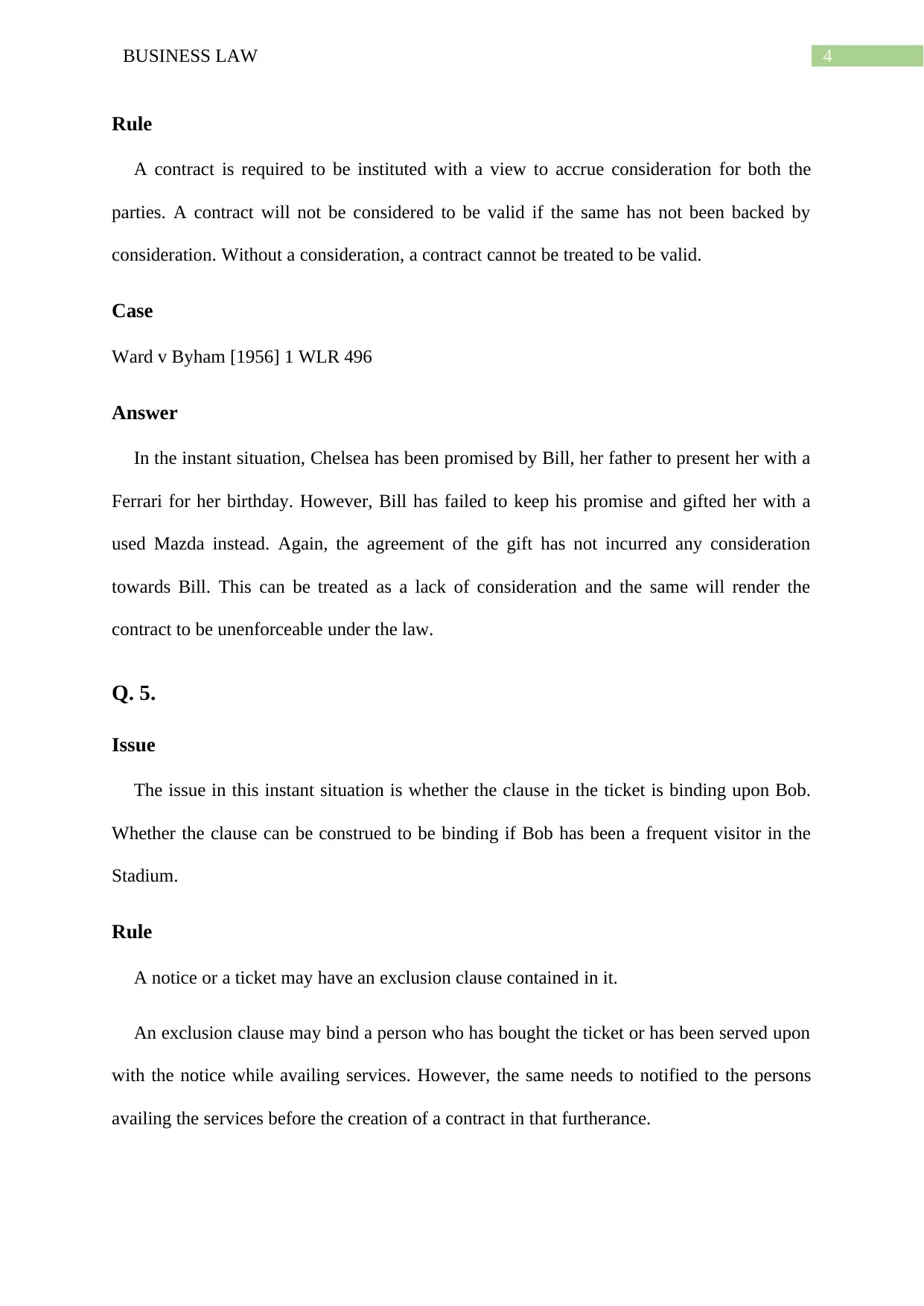
4BUSINESS LAW
Rule
A contract is required to be instituted with a view to accrue consideration for both the
parties. A contract will not be considered to be valid if the same has not been backed by
consideration. Without a consideration, a contract cannot be treated to be valid.
Case
Ward v Byham [1956] 1 WLR 496
Answer
In the instant situation, Chelsea has been promised by Bill, her father to present her with a
Ferrari for her birthday. However, Bill has failed to keep his promise and gifted her with a
used Mazda instead. Again, the agreement of the gift has not incurred any consideration
towards Bill. This can be treated as a lack of consideration and the same will render the
contract to be unenforceable under the law.
Q. 5.
Issue
The issue in this instant situation is whether the clause in the ticket is binding upon Bob.
Whether the clause can be construed to be binding if Bob has been a frequent visitor in the
Stadium.
Rule
A notice or a ticket may have an exclusion clause contained in it.
An exclusion clause may bind a person who has bought the ticket or has been served upon
with the notice while availing services. However, the same needs to notified to the persons
availing the services before the creation of a contract in that furtherance.
Rule
A contract is required to be instituted with a view to accrue consideration for both the
parties. A contract will not be considered to be valid if the same has not been backed by
consideration. Without a consideration, a contract cannot be treated to be valid.
Case
Ward v Byham [1956] 1 WLR 496
Answer
In the instant situation, Chelsea has been promised by Bill, her father to present her with a
Ferrari for her birthday. However, Bill has failed to keep his promise and gifted her with a
used Mazda instead. Again, the agreement of the gift has not incurred any consideration
towards Bill. This can be treated as a lack of consideration and the same will render the
contract to be unenforceable under the law.
Q. 5.
Issue
The issue in this instant situation is whether the clause in the ticket is binding upon Bob.
Whether the clause can be construed to be binding if Bob has been a frequent visitor in the
Stadium.
Rule
A notice or a ticket may have an exclusion clause contained in it.
An exclusion clause may bind a person who has bought the ticket or has been served upon
with the notice while availing services. However, the same needs to notified to the persons
availing the services before the creation of a contract in that furtherance.
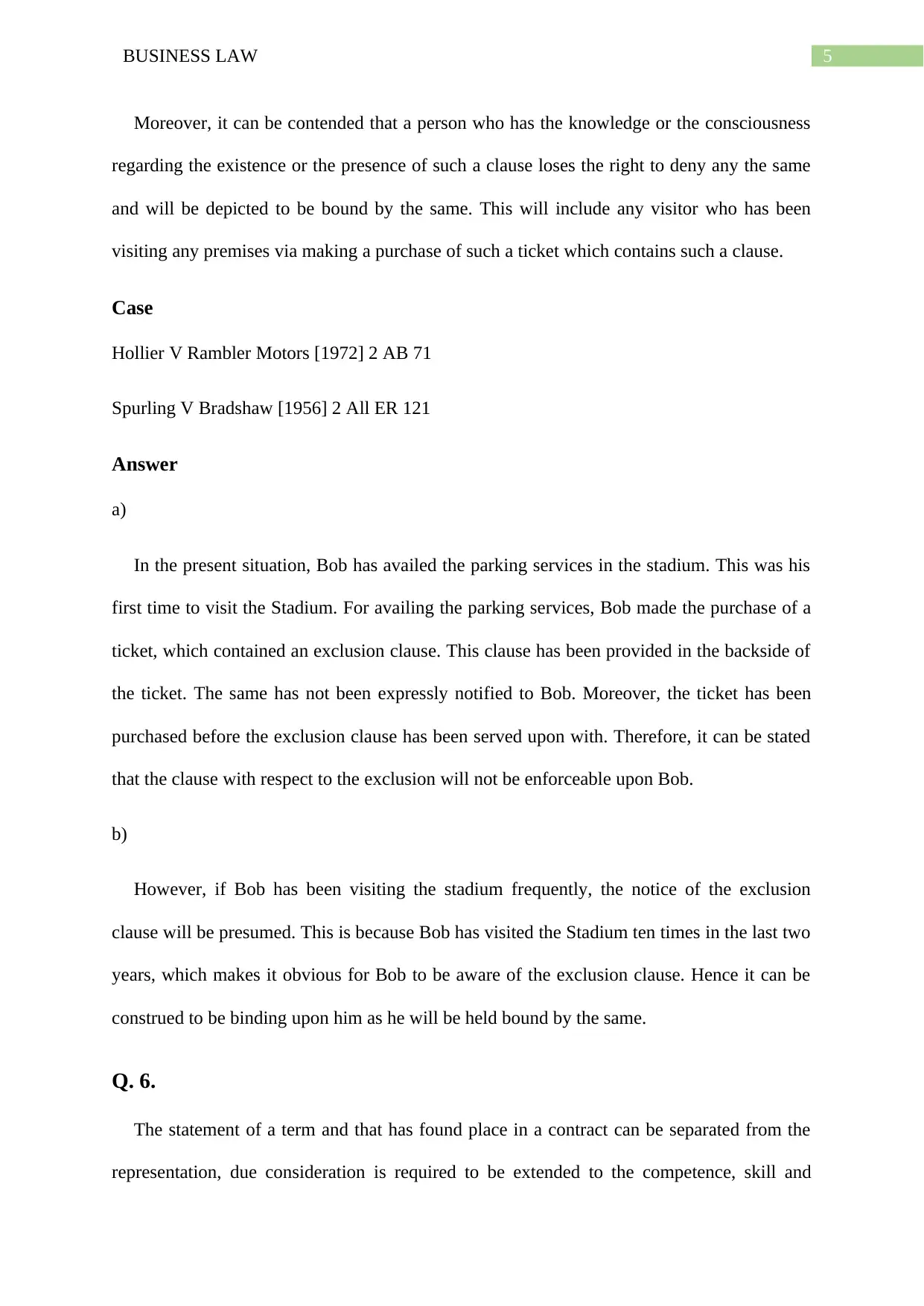
5BUSINESS LAW
Moreover, it can be contended that a person who has the knowledge or the consciousness
regarding the existence or the presence of such a clause loses the right to deny any the same
and will be depicted to be bound by the same. This will include any visitor who has been
visiting any premises via making a purchase of such a ticket which contains such a clause.
Case
Hollier V Rambler Motors [1972] 2 AB 71
Spurling V Bradshaw [1956] 2 All ER 121
Answer
a)
In the present situation, Bob has availed the parking services in the stadium. This was his
first time to visit the Stadium. For availing the parking services, Bob made the purchase of a
ticket, which contained an exclusion clause. This clause has been provided in the backside of
the ticket. The same has not been expressly notified to Bob. Moreover, the ticket has been
purchased before the exclusion clause has been served upon with. Therefore, it can be stated
that the clause with respect to the exclusion will not be enforceable upon Bob.
b)
However, if Bob has been visiting the stadium frequently, the notice of the exclusion
clause will be presumed. This is because Bob has visited the Stadium ten times in the last two
years, which makes it obvious for Bob to be aware of the exclusion clause. Hence it can be
construed to be binding upon him as he will be held bound by the same.
Q. 6.
The statement of a term and that has found place in a contract can be separated from the
representation, due consideration is required to be extended to the competence, skill and
Moreover, it can be contended that a person who has the knowledge or the consciousness
regarding the existence or the presence of such a clause loses the right to deny any the same
and will be depicted to be bound by the same. This will include any visitor who has been
visiting any premises via making a purchase of such a ticket which contains such a clause.
Case
Hollier V Rambler Motors [1972] 2 AB 71
Spurling V Bradshaw [1956] 2 All ER 121
Answer
a)
In the present situation, Bob has availed the parking services in the stadium. This was his
first time to visit the Stadium. For availing the parking services, Bob made the purchase of a
ticket, which contained an exclusion clause. This clause has been provided in the backside of
the ticket. The same has not been expressly notified to Bob. Moreover, the ticket has been
purchased before the exclusion clause has been served upon with. Therefore, it can be stated
that the clause with respect to the exclusion will not be enforceable upon Bob.
b)
However, if Bob has been visiting the stadium frequently, the notice of the exclusion
clause will be presumed. This is because Bob has visited the Stadium ten times in the last two
years, which makes it obvious for Bob to be aware of the exclusion clause. Hence it can be
construed to be binding upon him as he will be held bound by the same.
Q. 6.
The statement of a term and that has found place in a contract can be separated from the
representation, due consideration is required to be extended to the competence, skill and
⊘ This is a preview!⊘
Do you want full access?
Subscribe today to unlock all pages.

Trusted by 1+ million students worldwide
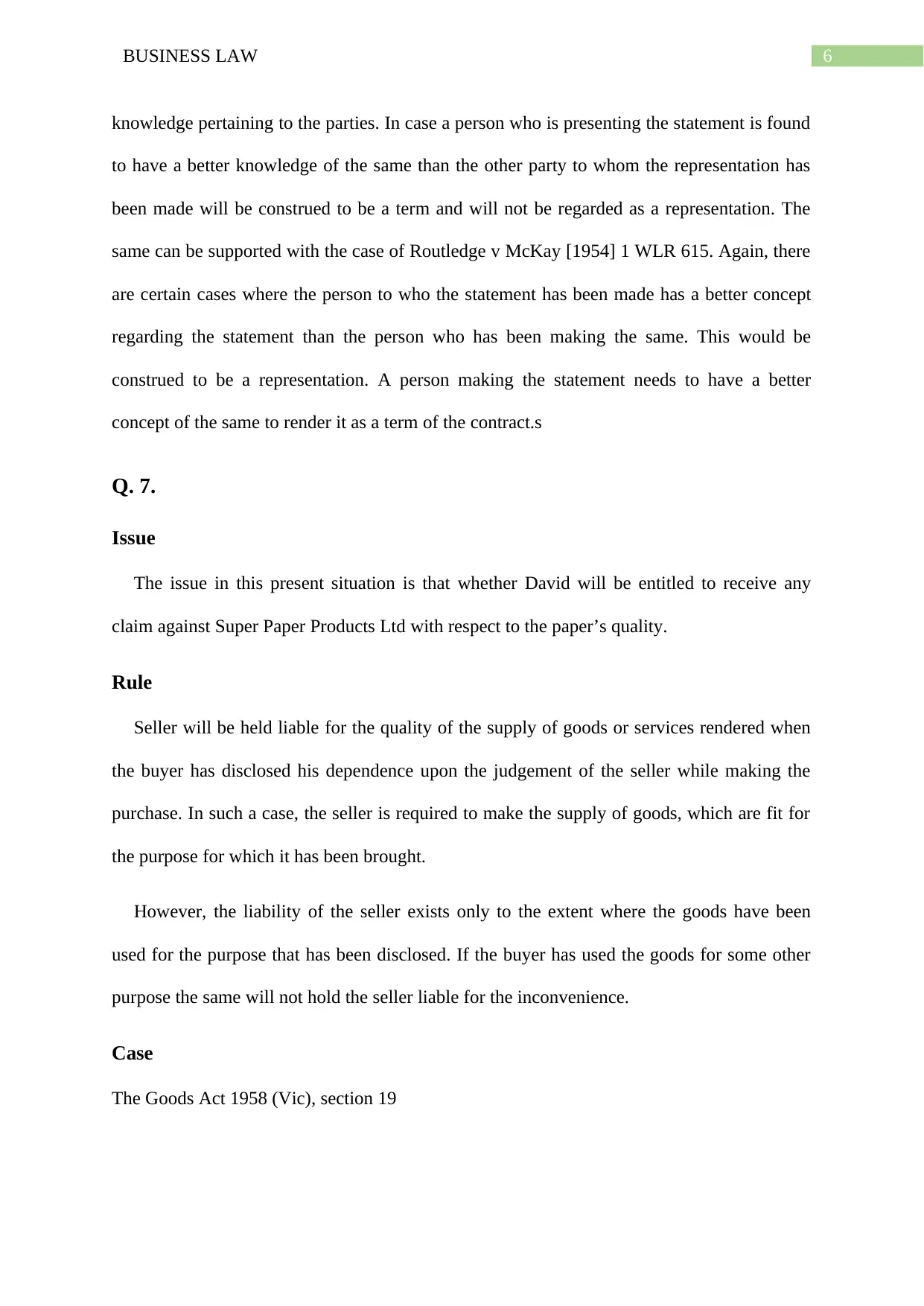
6BUSINESS LAW
knowledge pertaining to the parties. In case a person who is presenting the statement is found
to have a better knowledge of the same than the other party to whom the representation has
been made will be construed to be a term and will not be regarded as a representation. The
same can be supported with the case of Routledge v McKay [1954] 1 WLR 615. Again, there
are certain cases where the person to who the statement has been made has a better concept
regarding the statement than the person who has been making the same. This would be
construed to be a representation. A person making the statement needs to have a better
concept of the same to render it as a term of the contract.s
Q. 7.
Issue
The issue in this present situation is that whether David will be entitled to receive any
claim against Super Paper Products Ltd with respect to the paper’s quality.
Rule
Seller will be held liable for the quality of the supply of goods or services rendered when
the buyer has disclosed his dependence upon the judgement of the seller while making the
purchase. In such a case, the seller is required to make the supply of goods, which are fit for
the purpose for which it has been brought.
However, the liability of the seller exists only to the extent where the goods have been
used for the purpose that has been disclosed. If the buyer has used the goods for some other
purpose the same will not hold the seller liable for the inconvenience.
Case
The Goods Act 1958 (Vic), section 19
knowledge pertaining to the parties. In case a person who is presenting the statement is found
to have a better knowledge of the same than the other party to whom the representation has
been made will be construed to be a term and will not be regarded as a representation. The
same can be supported with the case of Routledge v McKay [1954] 1 WLR 615. Again, there
are certain cases where the person to who the statement has been made has a better concept
regarding the statement than the person who has been making the same. This would be
construed to be a representation. A person making the statement needs to have a better
concept of the same to render it as a term of the contract.s
Q. 7.
Issue
The issue in this present situation is that whether David will be entitled to receive any
claim against Super Paper Products Ltd with respect to the paper’s quality.
Rule
Seller will be held liable for the quality of the supply of goods or services rendered when
the buyer has disclosed his dependence upon the judgement of the seller while making the
purchase. In such a case, the seller is required to make the supply of goods, which are fit for
the purpose for which it has been brought.
However, the liability of the seller exists only to the extent where the goods have been
used for the purpose that has been disclosed. If the buyer has used the goods for some other
purpose the same will not hold the seller liable for the inconvenience.
Case
The Goods Act 1958 (Vic), section 19
Paraphrase This Document
Need a fresh take? Get an instant paraphrase of this document with our AI Paraphraser
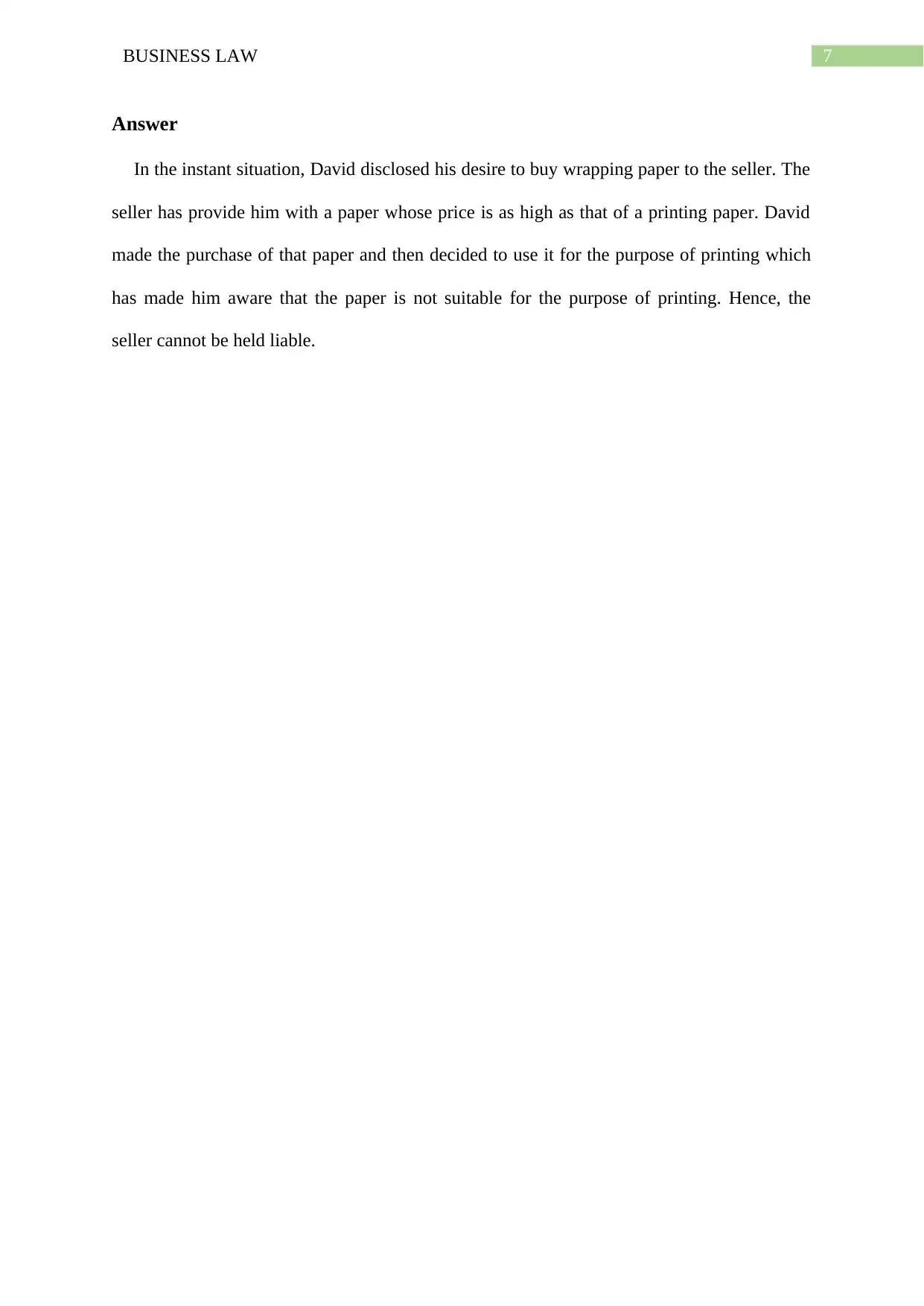
7BUSINESS LAW
Answer
In the instant situation, David disclosed his desire to buy wrapping paper to the seller. The
seller has provide him with a paper whose price is as high as that of a printing paper. David
made the purchase of that paper and then decided to use it for the purpose of printing which
has made him aware that the paper is not suitable for the purpose of printing. Hence, the
seller cannot be held liable.
Answer
In the instant situation, David disclosed his desire to buy wrapping paper to the seller. The
seller has provide him with a paper whose price is as high as that of a printing paper. David
made the purchase of that paper and then decided to use it for the purpose of printing which
has made him aware that the paper is not suitable for the purpose of printing. Hence, the
seller cannot be held liable.
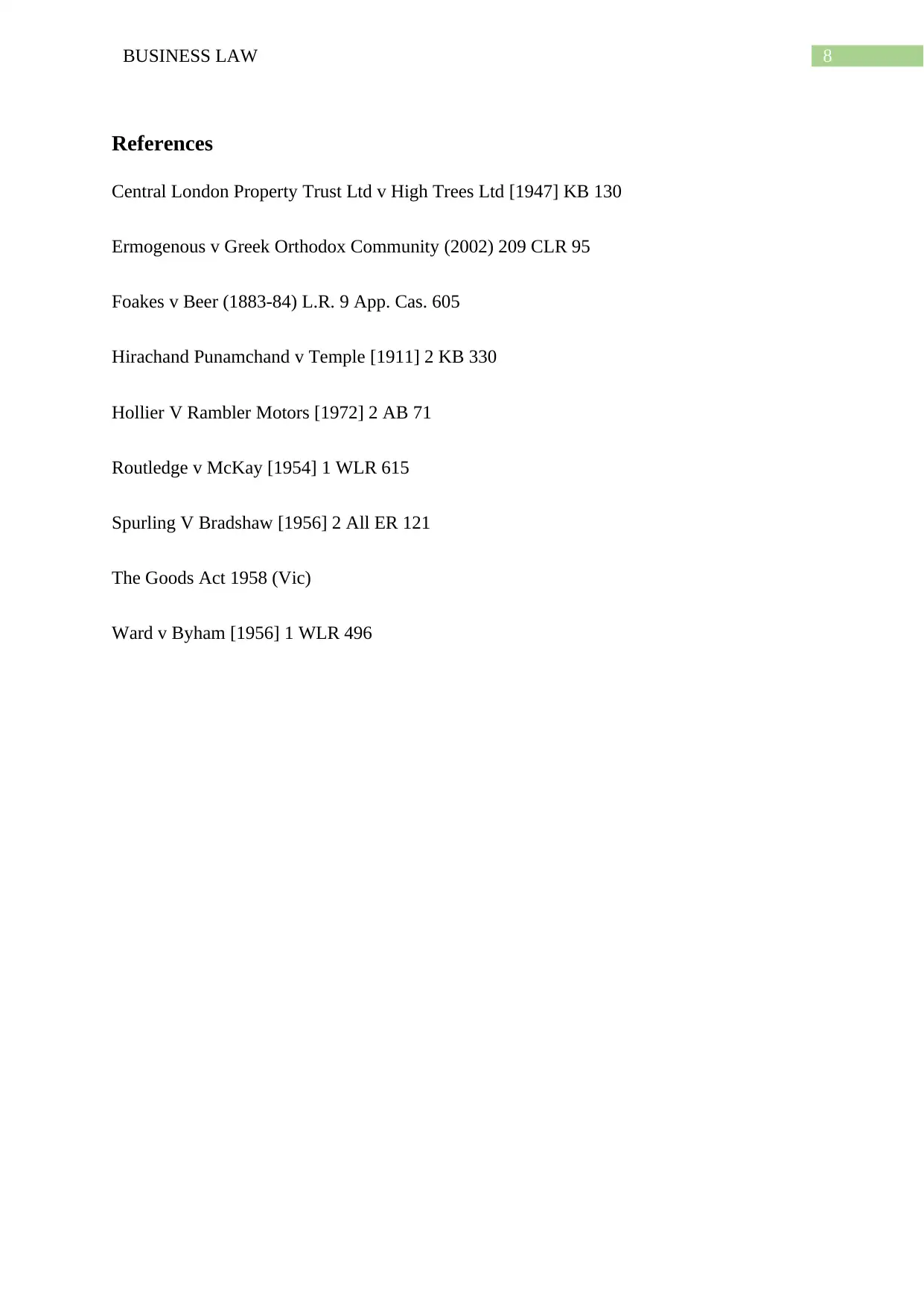
8BUSINESS LAW
References
Central London Property Trust Ltd v High Trees Ltd [1947] KB 130
Ermogenous v Greek Orthodox Community (2002) 209 CLR 95
Foakes v Beer (1883-84) L.R. 9 App. Cas. 605
Hirachand Punamchand v Temple [1911] 2 KB 330
Hollier V Rambler Motors [1972] 2 AB 71
Routledge v McKay [1954] 1 WLR 615
Spurling V Bradshaw [1956] 2 All ER 121
The Goods Act 1958 (Vic)
Ward v Byham [1956] 1 WLR 496
References
Central London Property Trust Ltd v High Trees Ltd [1947] KB 130
Ermogenous v Greek Orthodox Community (2002) 209 CLR 95
Foakes v Beer (1883-84) L.R. 9 App. Cas. 605
Hirachand Punamchand v Temple [1911] 2 KB 330
Hollier V Rambler Motors [1972] 2 AB 71
Routledge v McKay [1954] 1 WLR 615
Spurling V Bradshaw [1956] 2 All ER 121
The Goods Act 1958 (Vic)
Ward v Byham [1956] 1 WLR 496
⊘ This is a preview!⊘
Do you want full access?
Subscribe today to unlock all pages.

Trusted by 1+ million students worldwide
1 out of 9
Related Documents
Your All-in-One AI-Powered Toolkit for Academic Success.
+13062052269
info@desklib.com
Available 24*7 on WhatsApp / Email
![[object Object]](/_next/static/media/star-bottom.7253800d.svg)
Unlock your academic potential
Copyright © 2020–2026 A2Z Services. All Rights Reserved. Developed and managed by ZUCOL.




